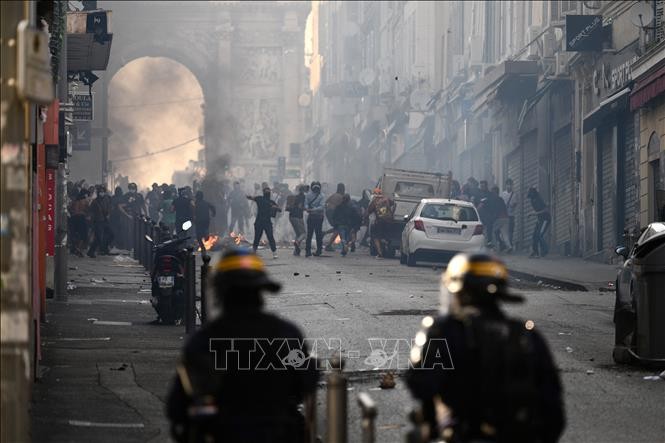(VOVWORLD) - Protests broke out and turned into riots in many French cities over the past week, after the police shot dead a French boy of Algerian origin on the outskirts of Paris.
 Extreme protesters clash with police in Marseille on June 30, 2023 (Photo: AFP/VNA) Extreme protesters clash with police in Marseille on June 30, 2023 (Photo: AFP/VNA) |
The protests have lasted six days, and protesters have set cars on fire, set up barricades in the streets, and hurled fireworks at the police, who have responded with tear gas. The French government has deployed 45,000 policemen and armored vehicles across the country to quell the riots.
Reason for the riots
On the morning of June 27, a 17-year-old teenager identified as Nahel M., was shot dead during a traffic stop in Nanterre. According to the local prosecutor, Nahel had previously refused to stop after he was observed driving in a bus-dedicated lane. After he was forced to stop, two policemen approached his car.
According to videos shared online, two police officers leaned against the driver's side window and as the vehicle sped away, one officer opened fire, shooting through the driver's window at close range. Nahel died on the spot from a bullet that pierced his left arm and chest.
Prosecutors say the officer who shot Nahel is being formally investigated for attempted murder and is being held in custody. The police officer admitted shooting Nahel, reasoning that he wanted to prevent a car chase to protect innocent people on the street after Nahel violated the law.
Thousands of people marched in memory of Nahel on the streets of Nanterre. The marching crowd included the victim's mother, who wore a white T-shirt that read "Justice for Nahel" and the date he was shot. Protests broke out outside police headquarters in Nanterre and at least 10 other French cities.
A video of the shooting sparked violence and enflamed long-simmering tensions between the police and youths in disadvantaged urban neighborhoods.
Protesters accuse the French police of excessive violence and systemic racism, and demand police reform, echoing the Black Lives Matter movement in the US after the death of George Floyd at the hands of police in Minnesota.
The Nanterre shooting revived painful memories of the 2005 riots in France that followed the deaths of two young men by electrocution at a substation while fleeing police. Those riots lasted three weeks and forced President Jacques Chirac to declare a state of emergency.
Government response
President Emmanuel Macron said: "Nothing can justify the death of such a young person" and called the shooting "inexcusable and unforgivable". The government has deployed 45,000 police and armored vehicles to keep the violence from escalating. Reacting to this internal crisis, President Macron canceled a visit to Germany from July 2-4, but he rejected a request to declare a state of emergency.
French Interior Minister Gérald Darmanin ordered the closure of all public bus and tram services after 9 p.m. nationwide. Authorities in several cities also canceled previously planned large-scale events, including concerts at the Stade de France.
Macron urged parents not to let teenagers go out on the streets, saying social media had played a significant role in inciting the riots. He singled out Snapchat and TikTok as platforms being used to incite riots and cause unrest. Cities and regions across the country have prepared for further protests.
Consequences
More than 2,000 cars have been burned and more than 500 buildings have been damaged. Shops have been looted and clashes have broken out between protesters and riot police in dozens of cities across France.
According to the French Interior Ministry, the riots have forced police to arrest 3,000 people. 1,300 people were arrested last Friday alone. More than 200 policemen have been injured.
The wave of protests in France has now spread to Switzerland. Demonstrations have taken place in Lausanne in response to calls on social networks. So far, seven people have been arrested there.
Many other countries have voiced concerns and issued warnings to their citizens. On Friday evening protesters in Marseille attacked a bus carrying 31 Chinese tourists and injured five people. The Chinese Consulate in Marseille sent a note asking the French authorities to ensure the safety of Chinese citizens and their property.
On Sunday, German Chancellor Olaf Scholz expressed his concern about the riots in France.
On Twitter, Iranian Foreign Ministry spokesman Nasser Kanani urged Iranian citizens to reconsider non-essential trips to France and recommended that Iranian citizens in France avoid conflict zones.